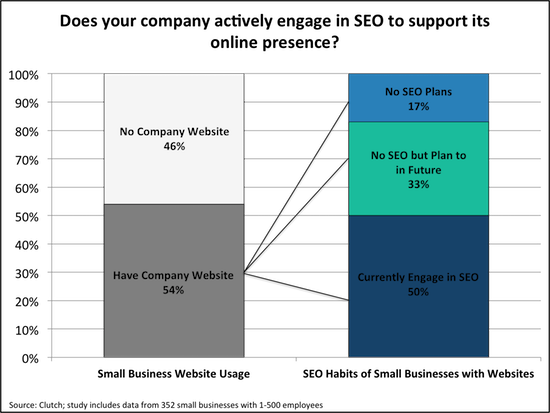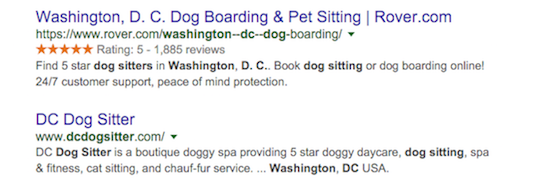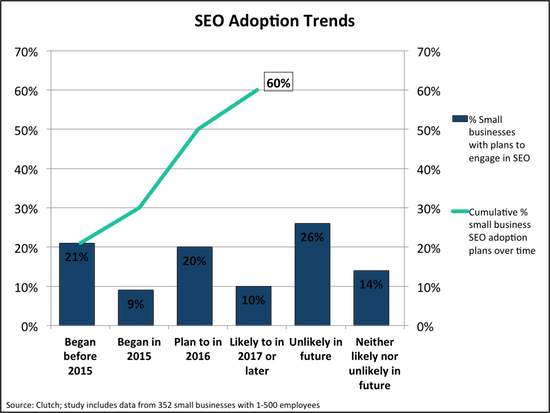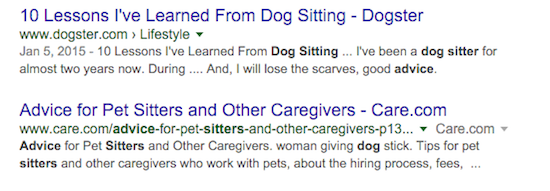
Get your FREE 30-day trial.
Please complete all fields.
Search engine optimization (SEO) is a vital digital marketing strategy for small businesses seeking to grow. Unfortunately, half of small businesses in the US that maintain a company website do not engage in SEO, according to a survey on small business digital marketing trends.

Not engaging in SEO leaves being found online to chance, which is detrimental for growth goals. Overall, SEO can benefit small businesses in numerous ways, most important, by building an audience that trusts your company, brand, products, and resources.
Why do small businesses neglect SEO in spite of the growth potential it offers? How can SEO contribute to growth?
SEO can be scary for small business owners and managers. It is an expensive, complicated, and time-consuming endeavor. However, if your business does not show up on a search engine page, potential customers are likely to navigate to business competitors — any company in your industry area that shows up on the page ahead of you.
“Having a website but not doing SEO is like getting into the passenger seat of a car that’s being driven by a robot. Chances are, it’s going to end well, but there’s also a chance that the trip won’t work out the way you planned.” – Duane Forrester, Vice President of Organic Search Operations, Bruce Clay, Inc.
For example, let’s say you offer a dog sitting service in Washington, DC. When a potential customer searches, “dog sitter washington dc” in Google, the most reliable sites appear.

Unfortunately, even though you have a website with information about your services, prices, and location, your competitors appear on the first page of Google, while your business does not.
Because you do not engage in SEO by optimizing your site for usability, creating quality content, or acquiring reputable backlinks, your business is not considered an authority about dog sitting.
However, despite low or nonexistent SEO engagement in the small business market, there is hope for the future. By 2017 or later, 60 percent of small businesses plan to implement an SEO strategy.

If you are still on the fence about the value SEO can add to your business, consider three ways even the most basic SEO strategy can build brand authority and improve audience engagement.
Showing up high on a search engine page demonstrates that other users find your business’ products, services, and resources useful.
In SEO, the quality of backlinks to your website, positive attributions, and on-site usability determine usefulness.
Think of it this way:
During your lunch break, you solicit feedback from your colleagues about a new restaurant that opened in town.
One colleague tells you that the restaurant has the best steak he’s ever tasted.
Another colleague exclaims, “You haven’t gone yet? I’m taking you there for lunch tomorrow!”
The first colleague represents a positive attribution. The colleague encouraged you to check out the restaurant.
The second colleague exemplifies a direct link from a blog. He wants to sell you on going to the restaurant by making you have the full experience.
While different, both interactions bolster the restaurant’s reputation and make you want to grab a meal. Similarly, creating quality content on your site, writing articles about the content and publishing them on reputable sites, and reaching out to influencers to write about your business will improve your reputation online.
After potential customers find your business online, how do you get them to return to your website and continue to use the resources you offer?
In the small business market, onsite optimization and local search optimization are the most frequently employed SEO tactics.

On-site optimization ensures that users have a positive experience when they visit your business’ website and increases the likelihood that the visitor will return to your site.
What on-site components contribute to a positive user experience?
A. If page load times take more than three seconds, users are more likely to leave, which inhibits converting potential customers.
B. Clear calls to action (CTA) demonstrate how users can interact with your brand.
C. Website responsiveness ensures users come away with a positive impression of your business and increases the probability of converting them.
Creating quality content that earns links is one way small businesses not only bolster their SEO strategy but also build authority and reliability online.
Content allows a business to answer a potential customer’s questions, either through custom content or links to other relevant resources.
This ability to answer questions — serve as a resource — fosters trust and guarantees return users.
“Content is a means of educating customers so that they feel something for the company. Then, later on, if the potential customer needs something, they will go to the company that built their trust in the first place by providing useful resources.” – Garrett Mehrguth, President and CEO, Directive Consulting
For example, as the owner of a local dog sitting business, creating a blog and publishing articles focused on dog sitting tips, tricks, and lessons will build your reputation as a reliable resource on the topic.

Quality content enables a business not only to offer a service but also to serve as a resource. Customers can visit your site to set up dog sitting appointments or to engage with the information on your blog.
As small businesses adapt their digital marketing plans throughout the year to meet evolving needs and goals, SEO should become a priority.
The digital marketing tactic spurs growth by ensuring more customers can find you online, as well as facilitates relationship building between a brand and its customers.
Although SEO may be scary at first, the long-term benefits are worth the initial large investment in time and money. What feats would you be capable of if you took the time to improve your business’ reputation online, create an enjoyable user experience on-site, and position your business as a reliable resource.
What SEO tactics does your small business employee?
Sarah is an analyst at Clutch. As a member of the marketing team, she conducts research that aims to help consumers select agencies and firms and use IT services and software that enhance their business. Clutch is a Washington, DC-based research, reviews, and ratings platform for B2B. It identifies leading software and professional services firms that deliver results for their clients.